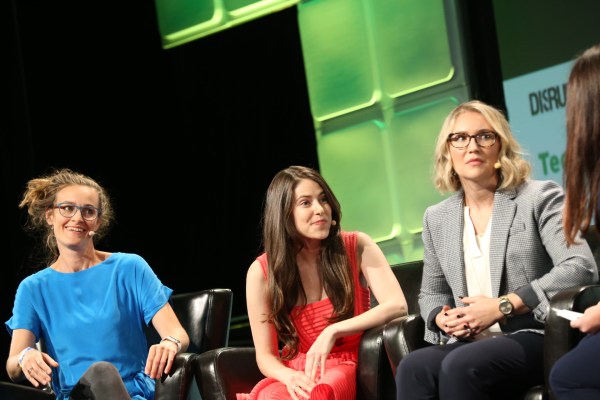Entrepreneurs building tech products for women spoke at TechCrunch Disrupt SF today, and called on their peers in the industry to set a high ethical bar when it comes to using or sharing women’s intimate data.
Janica Alvarez’s startup Naya Health makes a smart breast pump and bottle to help nursing mothers know exactly how much milk they’re producing and how much their babies are consuming.
Alvarez cited a Rock Health study that estimated there was about $4.5 billion in venture capital investments in digital health last year, and a quarter of that went into biosensing products, like her company’s.
She hoped that insights that will soon come from technology, particularly to help nursing mothers keep breastfeeding their babies if they want to, especially after they go back to work. She said, “We need better solutions but we won’t find them without data.”
The CEO of Fertility IQ, Deborah Anderson-Bialis, agreed. On her own company’s site, users are asked to enter 80 data points about their health and fertility, and experiences with IVF or in-vitro fertilization treatments. They share reviews and information with a community of women who want to but are struggling to get pregnant.
[gallery ids="1386169,1386161,1386162,1386173,1386146,1386150"]
Fertility IQ takes care to verify that those who write reviews and offer information on her site are actually the patients of the doctors they review to keep review quality high. But even with all that sharing, privacy is of tantamount importance to users who don’t want their health issues aired publicly, or don’t want doctors who they may not have reviewed favorably to seek revenge.
Then the CEO of a company that makes the popular period-tracking app Clue, Ida Tin, said she was looking forward to a time when wearables and mobile phones could do more technically complex things like disease detection.
But she cautioned, “I’m excited about looking into the body on a molecular level….but companies like mine generate really intimate data. They should have a very high ethical bar for what they do with that information. This is not common in the industry, yet.”
In light of the privacy concerns, moderator Sarah Buhr questioned Tin about a new feature within the Clue app that lets users share their data with one another. Privacy flaws were uncovered and addressed recently by a fertility tracker app called Glow which competes with Clue.
Tin said Clue Connect, a feature that launched this month, was actually one case where users wanted to be able to share their data, albeit privately, with their loved ones.
“Women tell us that they want to share with their partners, or a mom or daughter, or a good friend. A lot of men also want to know what’s going on in their dear one’s lives. I think that’s great, it helps us communicate about social health, not just about periods but how do I feel, am I in pain, where is my sex drive.”
